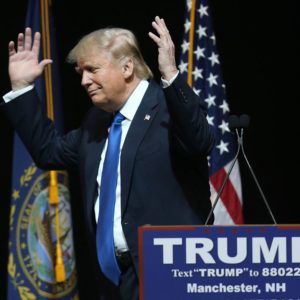In a much-discussed New York Times column, an Obama administration advisor looked at the most reliable and well-tested economic predictors of presidential elections and declared that, based on the data, the outcome is clear:
Donald Trump is a lock to be re-elected.
The fact that Trump clearly isn’t is part of an “economics vs. partisanship” political trend nationwide that’s been underway in New Hampshire for two decades.
In his Times piece, Steven Rattner wrote about economics-based election models that political data nerds have been watching for a while. Most political reporters follow opinion polls, but smart people know the numbers that really matter are the ones with dollar signs attached: GDP, inflation and jobs. One of the most successful of these electoral models is Yale Professor Ray Fair’s. While it’s not perfect, it’s been extremely good, picking the vast majority of presidential elections accurately.
And, as Rattner writes, “In its present state, the economy will also be helpful to the president. All told, Mr. Trump’s vote share [using the Ray Fair model] would ordinarily be as high as 56.1.”
A few weeks ago, Politico wrote a story about these economic models and came to the same conclusion.
“The economy is just so damn strong right now and by all historic precedent the incumbent should run away with it,” Donald Luskin of TrendMacrolytics said. His firm correctly predicted Trump’s win in 2016.
Another economist, Mark Zandi, ran 12 different models based on known correlations between economics and elections and all 12 came back with Trump on top in 2020. “If the election were held today, Trump would win according to the models and pretty handily,” Zandi said.
And yet, almost nobody believes that. Certainly, nobody believes Trump is going to get 56 percent of the vote. Barack Obama only got 53 percent running against Sen. John McCain in the middle of an economic meltdown.
In fact, based on current polling, Trump would be lucky to get 46 percent of the vote. About 54 percent of Americans surveyed say they’ve already decided they won’t vote to re-elect President Trump.
Could some of those voters be lying? Could voters change their mind as the election approaches? Could the Democrats nominate someone so far from the political mainstream (koff “Bernie Sanders” koff) that Trump wins by default? Of course.
But it’s just as likely that America has reached the end of the “It’s the Economy” era. An era that ended in New Hampshire (at least at the presidential level) years ago.
Most people know that, since 1992, the only Republican to win New Hampshire was George W. Bush. But many mistakenly think he won in the post-9/11 election of 2004. Actually, New Hampshire rejected W. that year for John “Reporting for Duty” Kerry. Bush won New Hampshire in 2000–despite astonishingly low 2.7 percent unemployment in the Granite State. Average household income jumped by more than 5 percent from 1999 to 2000 in New Hampshire, far faster than the national average.
If any state should have given Democrat Bill Clinton’s vice president four years in the big chair, it was New Hampshire. But Al Gore lost.
In 2008, with the Great Recession underway, Democrat Barack Obama easily defeated John McCain here. But four years later with the economy still struggling, growth rates flat and unemployment stuck about 40 percent higher than when he took office, President Obama still easily defeated “The Pride of Wolfeboro” Mitt Romney by six points. There was virtually no backlash for New Hampshire’s struggling economy.
In 2o16, with the New Hampshire economy in full recovery, unemployment below 3 percent and steady GDP growth, the incumbent party’s nominee– Hillary Clinton– eeked out a 3,000 vote victory over an untested and highly-controversial challenger.
And then there’s 1992, when a funny little guy from Texas named H. Ross Perot running as an independent got 23 percent of the Granite State vote…
It’s possible to look at these results and say the real story is that New Hampshire, like the rest of New England, has become a one-party state at the federal level. Republicans can win state elections, but since the year 2000, the national GOP has just been too out-of-step with New England to have any success.
Republicans can point to Trump’s performance and claim that the right candidate can still win here.
But it could be that New Hampshire is a bellwether for a broader national trend in the battle between economic effectiveness vs. political partisanship.

